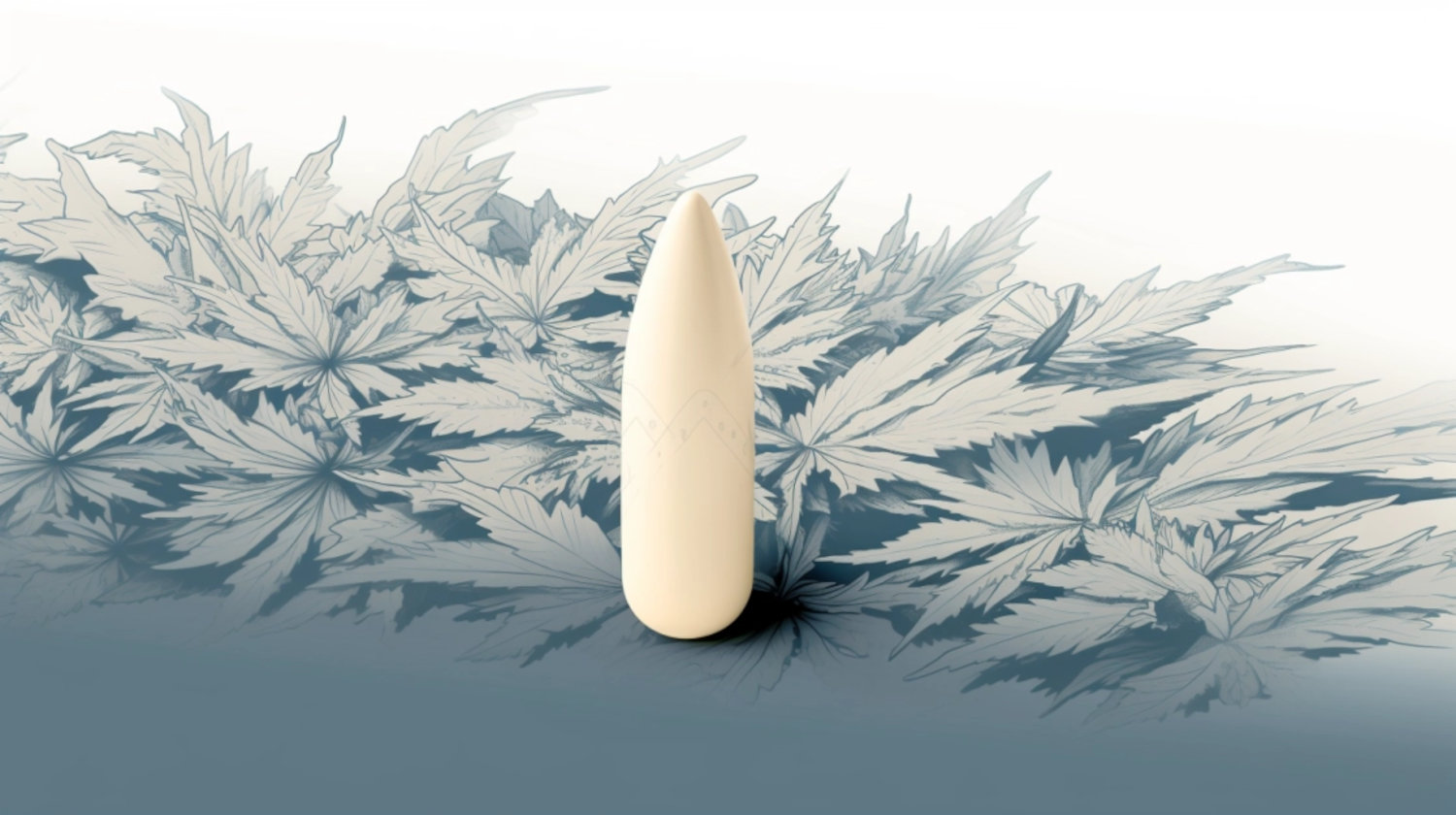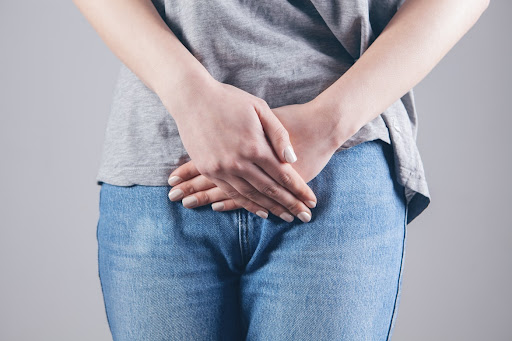In This Article
- What Are THC Infused Tampons?
- How is it Different From a CBD Tampon? How is it Different From a Hemp Tampon?
- Can You Get High From THC Tampons?
- Are There Any Benefits to Using an Infused Tampon? Can They Help With Cramps?
- Are There Any Side Effects or Potential Risks to Using a Weed Tampon?
- Can THC Tampons Interfere With Birth Control?
- Are THC Tampons Better Than Other Cannabis Products Designed to Minimize Menstrual Pain?
- Are There States Where THC Tampons Aren’t Legal?
- Are THC Tampons Allowed on Flights? What About in Carry-ons or Checked Luggage?
- How Can I Safely Use Weed Tampons? What Should I Stay Away From When Using One?
- About Dr. Jacob Moore
- References
Menstrual pain is nearly universal. Nearly 80% of women experience it.
Specialized women’s health products, including period care, are a rising category in the cannabis industry. Cannabis helps with pain, and periods can be painful. Innovators looked for a way to get the cannabis relief to the site of the pain, creating THC tampons.
THC tampons or weed tampons are vaginal suppositories. CBD tampon products combine the therapeutic properties of CBD with the monthly need to manage menstruation flow.
Are cannabis tampons worth trying to aid in alleviating menstrual pain?
What Are THC Infused Tampons?
THC tampons incorporate THC (tetrahydrocannabinol) into vaginal suppositories. Unlike traditional tampons, they do not provide period protection.
THC is combined with a carrier oil, such as cocoa butter, and vagina-friendly botanicals to protect the vaginal biome.
When inserted, the THC interacts with the cannabinoid receptors in the vagina, potentially providing relief from cramps and inflammation without inducing an intoxicating high.
By focusing on localized delivery, THC tampons direct medication where it’s needed, potentially reducing the need for systemic pain medications and their associated side effects.
How is it Different From a CBD Tampon? How is it Different From a Hemp Tampon?
When THC tampons arrived on the scene, the manufacturer called these vaginal suppositories “tampons” or “weed tampons.” The name stuck, and confusion ensued, and continues, over the term.
CBD tampons look and absorb like standard tampons with the bonus of period pain relief and period protection.
These tampons are treated with a coating of CBD. An inserted tampon places CBD’s anti-inflammatory and pain-relieving properties at the source of discomfort. Since CBD is non-intoxicating, symptom relief comes without any high.
Like CBD tampons, hemp tampons provide period flow protection. They’re made from the stem fibers of the hemp plant and processed into an absorbent, soft fiber.
Unless fortified with CBD or THC, hemp tampons don’t offer any analgesic effect.
The primary advantage of hemp fiber tampons is their sustainability and natural composition, which makes them preferred by those seeking eco-friendly menstrual products.

Can You Get High From THC Tampons?
The likelihood of feeling buzzed from a THC tampon is small. “No evidence to date has shown that you can get high from using a cannabis-infused tampon,” said obstetrics and gynecology specialist Dr. Jacob Moore, DO.
The local application of THC directs pain relief into the pelvic area toward the bundles of cannabinoid receptors that are within the uterus. While it's unlikely for users to get high, individuals who are highly sensitive to THC might notice a slight head high, but this wouldn’t amount to full intoxication.
Are There Any Benefits to Using an Infused Tampon? Can They Help With Cramps?
“Cannabis-infused tampons are reported to help with menstrual cramping.” Dr. Moore explains, “Cannabis-infused tampons are able to act locally and avoid the liver’s first pass, making them very effective to attach to the cannabinoid receptors in the uterus.”
The science behind this involves the endocannabinoid system, a network of cannabinoid receptors that use chemical signals to respond to stimuli.
Research identifies cannabinoid receptors, specifically CB1 and CB2, in pelvic areas such as the ovaries and the uterus lining. THC could directly affect these tissues to alleviate pain.1
Conditions like endometriosis, a condition where the uterine lining grows outside the uterus, can cause severe pelvic pain. Cysts can form in the uterine lining. THC, interacting with the CB1 and CB2 receptors, can decrease pain and possibly reduce the size of these endometrial cysts.2
Women with pelvic pain express a preference for a variety of cannabinoid-based treatments. A substantial number of women expressed willingness to try vaginal cannabis products, like THC tampons, for targeted relief from menstrual and pelvic pain.3 This willingness underlines the broader acceptance and perceived effectiveness of cannabis-based products in managing discomfort.
In terms of overall effectiveness, it's clear from patient reports and clinical observations that THC can significantly alleviate pain associated with menstrual cramps. Women using cannabis for endometriosis report that it’s helpful for not only pelvic pain but also related symptoms, such as bloating. Currently, inhaled or vaped cannabis is the most common consumption method, followed by oral ingestion, like edibles or tinctures.4
THC-infused tampons could serve as an alternative for those seeking relief from menstrual cramps, leveraging the localized action of THC to reduce discomfort without systemic effects typically associated with other cannabis consumption methods.
Are There Any Side Effects or Potential Risks to Using a Weed Tampon?
While THC-infused tampons offer promising benefits for menstrual pain relief, it's important to consider any potential side effects or risks associated with their use.
Dr. Moore gives us the good news, “The beauty of cannabis is that there are little or no side effects.”
Individual sensitivities to THC can vary, however, and some women who are sensitive to THC may not like the effects. Dr. Moore warns, “Caution would be advised when using alcohol as this could increase the effects of cannabis.”
Potential sensitivities or allergies can arise from THC tampon ingredients. Women should review ingredient lists for any known allergies to avoid side effects.

Can THC Tampons Interfere With Birth Control?
Dr. Moore said, “No studies to date have shown that cannabis tampons will interfere with birth control. Because the tampons work locally, they avoid the liver’s interactions where contraceptives are metabolized.”
There is no current evidence THC tampons or other cannabis products directly interfere with the effectiveness of birth control methods. Cannabinoids like THC don’t impact the performance of hormonal contraceptives, such as pills, patches, rings, or IUDs.
While the effectiveness of birth control doesn’t change with cannabis use, women using a hormone-based birth control method should be aware of an elevated risk of depression with cannabis use.5 Although unlikely, THC tampons could contribute to this effect.

Are THC Tampons Better Than Other Cannabis Products Designed to Minimize Menstrual Pain?
Dr. Moore is optimistic about the effectiveness of weed tampons. “Yes, I would definitely recommend cannabis tampons for patients with dysmenorrhea.” He cites two reasons: proximity to the area of pain and efficient relief. “Because the tampons are able to avoid liver metabolism since they are inserted locally at the source, they will work much better and quicker than other forms of cannabis.”
When choosing a product, consider that CBD tampons are relatively expensive, and THC tampon suppositories may provide relief for a lower cost. An estimated 22% of tampon products, including those labeled “organic,” “non-toxic,” or using “no harmful chemicals,” tested positive PFAS or “forever chemicals.” It’s important to do your research before using any cannabis tampon product.
Are There States Where THC Tampons Aren’t Legal?
THC tampons fall under federal and state laws. Adult-use or medical states (for patients with an active medical card) allow the possession of THC tampons, while other states do not.
CBD tampons containing less than 0.3% THC are legal in most states.
Always consult state and local laws in your area for updates.
Are THC Tampons Allowed on Flights? What About in Carry-ons or Checked Luggage?
Federal law classifies cannabis with over 0.3% THC as "marijuana," a Schedule I drug under the federal Controlled Substances Act of 1970. Since the TSA falls under federal jurisdiction, transporting cannabis through TSA security could lead to criminal charges.
Off the record, TSA agents say they are looking for bombs, not cannabis. If cannabis products are found in your carry-on or checked luggage, they may be thrown away without further penalty. People have traveled domestically with cannabis without incident, but the penalties can be severe. However, if you decide to hide weed in tampons on a plane, you do so at your own risk.

How Can I Safely Use Weed Tampons? What Should I Stay Away From When Using One?
Using weed tampons safely means following product instructions and being aware of your body's reactions. Dr. Moore emphasizes the importance of proper usage, "Make sure to follow the directions on cannabis tampon insertion and removal. Don’t leave tampons in for longer than the directions have specified. Cannabis tampons should be very effective at helping with severe dysmenorrhea."
Here are some additional guidelines for safe use and what to avoid:
- Hand Hygiene: Always wash your hands before and after inserting a tampon to prevent the spread of bacteria.
- Usage Timing: Use tampons only during your menstrual period and not at any other times.
- Change Regularly: Replace your tampon every 4 to 8 hours. Avoid leaving a tampon in for more than 8 hours.
- Appropriate Absorbency: Choose the lowest absorbency tampon necessary for your menstrual flow. Using a tampon with too high absorbency can increase the risk of TSS (toxic shock syndrome).
- Symptom Awareness: Be aware of the symptoms of TSS, which include sudden high fever, vomiting, diarrhea, dizziness, or a rash resembling a sunburn. If these symptoms occur, remove the tampon and seek medical attention immediately.
- Single Use: Only use tampons once; do not attempt to clean or reuse them.
- Monitor for Reactions: If you experience discomfort, pain, unusual discharge, or other unexpected symptoms while using a tampon, stop using them and consult your healthcare provider.
Always consider your health condition and consult with a healthcare provider if you have concerns about using cannabis-infused products for painful periods.
About Dr. Jacob Moore
Dr. Jacob Moore, DO is an Obstetrics & Gynecology Specialist in Oklahoma City, OK. With over 17 years of experience in the medical field, he both supports and recommends appropriate cannabis use for women’s health. He graduated from Oklahoma State University Center for Health Sciences College of Osteopathic Medicine in 2006.
References
- Walker OS, Holloway AC, Raha S. The role of the endocannabinoid system in female reproductive tissues. Journal of Ovarian Research. 2019;12(1). doi:https://doi.org/10.1186/s13048-018-0478-9 ↩︎
- Escudero-Lara A, Argerich J, Cabañero D, Maldonado R. Disease-modifying effects of natural Δ9-tetrahydrocannabinol in endometriosis-associated pain. eLife. 2020;9:e50356. doi:https://doi.org/10.7554/eLife.50356 ↩︎
- Yang EC, Koenig NA, Gong M, et al. Cannabis use preferences in women with myofascial pelvic pain: A cross-sectional study. European journal of obstetrics & gynecology and reproductive biology X. 2023;18:100192-100192. doi:https://doi.org/10.1016/j.eurox.2023.100192 ↩︎
- Sinclair J, Collett L, Abbott JA, Pate DW, Sarris J, Armour M. Effects of cannabis ingestion on endometriosis-associated pelvic pain and related symptoms. PloS one. 2021;16(10):e0258940-e0258940. doi:https://doi.org/10.1371/journal.pone.0258940 ↩︎
- Newman SD. Association Between Hormonal Birth Control, Substance Use, and Depression. Frontiers in Psychiatry. 2022;13(13). doi:https://doi.org/10.3389/fpsyt.2022.772412 ↩︎
The information in this article and any included images or charts are for educational purposes only. This information is neither a substitute for, nor does it replace, professional legal advice or medical advice, diagnosis, or treatment. If you have any concerns or questions about laws, regulations, or your health, you should always consult with an attorney, physician or other licensed professional.




